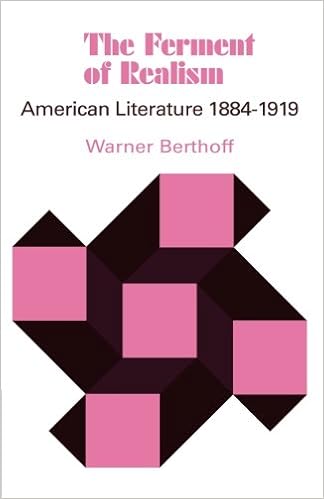Friday, February 26, 2010
On "The Ferment of Realism" by Warner Berthoff **
Ostensibly a history of American literature from 1884 to 1919, part of a series of books on the history of American literature published in the mid-1960s, this book shows its age. I was expecting a nuanced discussion of realism--its philosophical portents and how that works into the literature of the period. To that, one gets a few discussions on how writers aimed to pick up the regional feelings and dialects rather than looking to self-consciously literary language. But most of this volume focuses on what book critics such as Berthoff do and don't like. In other words, the book is like an extended review of many books and authors, none of whom come off wholly without some dirt on them save Henry James, who seemingly can do no wrong. In the sense that we mostly get a aesthetic appraisal, the book seems of its time period. I doubt most literary criticism today would focus so wholly on aesthetics. Sure, book reviewers might, but scholars tend instead to focus in philosophy and in the dynamics of how and why particular works appear the way they do. Hence, today's scholars may as easily write about what a video repair manual says about our society as what Shakespeare's continuing (or lack thereof) popularity means. Sometimes, this can get tiring. So I guess I should be happy to read a book so willing to take a stand on what is "good" or not. But expecting something else, it came as a disappointment. And not knowing wholly what Berthoff's singular aesthetic for evaluation is (I guess I need to read more James--only most of his material bores me), I'm left a little startled as to why one thing is good and not another. Instead, we get vague notions about something being more moral or imaginative than something else in one case, less true or universal in another, and so on. One of the most interesting sections for me was on authors who I knew less about--a chapter devoted to the nonfiction of the period. Berthoff's discussion also shines fairly well in the half a chapter devoted to poetry, in part because he does less evaluation of the quality of the verse (though there's still quite a bit on that, of course) and more evaluation on just how that verse was different from what came before and how it fit into realism. But as far as showing me more about underlying ideas for realism or even making me excited to go out and read any given author or work, I felt like I actually got more from the two nonfiction books on the Gilded Age I just completed who only dealt with literature in short half-chapter sections or in passing anecdotes.
Subscribe to:
Post Comments (Atom)







No comments:
Post a Comment